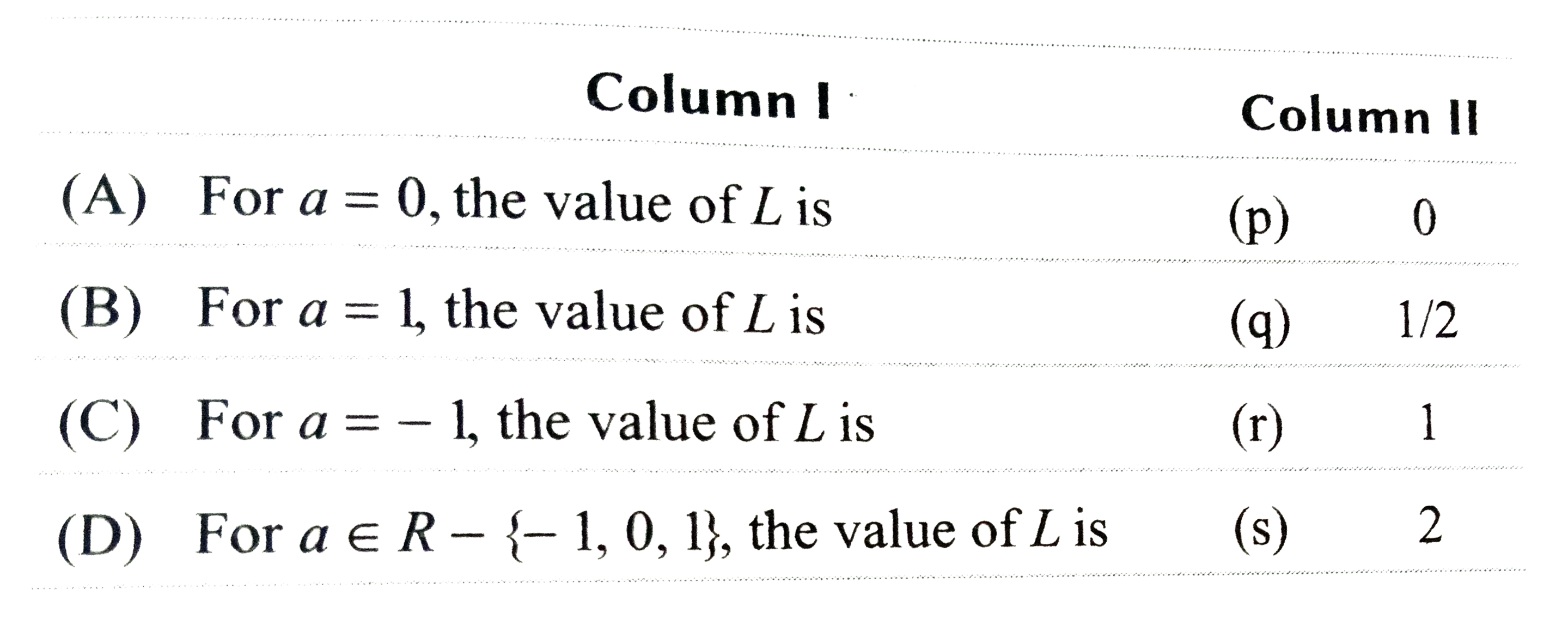Let f(x)=∫x−2e(1+t)2dt and g(x)=f(h(x)),where h(x) is defined for all x∈R. If g'(2)=e4 and h'(2)=1 then absolute value of sum of all possible values of h(2), is ___Solution in Punjabi
The correct Answer is:2
Step by step video solution for Let f(x) =int_(-2)^xe^((1+t)^2)dt and g(x) = f(h(x)),where h(x) is defined for all x in R. If g'(2) = e^4 and h'(2)=1 then absolute value of sum of all possible values of h(2), is ___ by Maths experts to help you in doubts & scoring excellent marks in Class 12 exams.
Updated on:21/07/2023Topper's Solved these Questions
- DEFINITE INTEGRALBOOK - ARIHANT MATHSCHAPTER - DEFINITE INTEGRALEXERCISE - Exercise (Questions Asked In Previous 13 Years Exam)
37 Videos
- DEFINITE INTEGRALBOOK - ARIHANT MATHSCHAPTER - DEFINITE INTEGRALEXERCISE - Exercise (Matching Type Questions)
4 Videos
- COORDINATE SYSTEM AND COORDINATES BOOK - ARIHANT MATHSCHAPTER - COORDINATE SYSTEM AND COORDINATES EXERCISE - Exercise (Questions Asked In Previous 13 Years Exam)
7 Videos
- DETERMINANTS BOOK - ARIHANT MATHSCHAPTER - DETERMINANTS EXERCISE - Exercise (Questions Asked In Previous 13 Years Exam)
18 Videos
Similar Questions
The total number of distinct x ∈ R for which
∣∣ ∣ ∣∣xx21+x32x4x21+8x33x9x21+27x3∣∣ ∣ ∣∣=10 is
View SolutionLet limT→∞1T∫T0(sinx+sinax)2dx=L, then

View SolutionIf a vertex of a triangle is (1, 1) and the mid-points of two side through this vertex are (-1, 2) and (3, 2), then centroid of the triangle is
View SolutionIf a2+b2+c2=−2, and f(x)= ∣∣ ∣ ∣∣1+a2x(1+b2)x(1+c2)x(1+a2)x1+b2x(1+c2)x(1+a2)x(1+b2)x1+c2x∣∣ ∣ ∣∣ , then f(x) is a polynomial of degree
View SolutionConsider f g and h are real-valued functions defined on R. Let f(x)-f(-x)=0 for all x in R, g(x) + g(-x)=0 for all x in R and h (x) + h(-x)=0 for all x in R. Also, f(1) = 0,f(4) = 2, f(3) = 6, g(1)=1, g(2)=4, g(3)=5, and h(1)=2, h(3)=5, h(6) = 3 The value of f(g(h(1)))+g(h(f(-3)))+h(f(g(-1))) is equal to
View SolutionLet f(x)=∫x−1et2dtandh(x)=f(1+g(x)), where g(x) is defined for all x,g'(x) exists for all x,andg(x)<0forx>0. If h'(1)=eandg'(1)=1, then the possible values which g(1) can take
View SolutionLet f(x) =int_(-2)^xe^((1+t)^2)dt and g(x) = f(h(x)),where h(x) is defined for all x in R. If g'(2) = e^4 and h' (2)=1 then absolute value of sum of all possible values of h(2), is
View SolutionLet f,g,h be differentiable functions of x. if Δ=∣∣ ∣ ∣∣fgh(xf)'(xg)'(xh)'(x2f)''(x2g)''(x2h)''∣∣ ∣ ∣∣and,Δ'=∣∣ ∣ ∣∣fghf'g'h'(xnf'')'(xng'')'(xnh'')'∣∣ ∣ ∣∣, then n =
View SolutionLet f:R→R and h:R→R be differentiable functions such that f(x)=x3+3x+2,g(f(x))=xandh(g(g(x)))=x for all x∈R. Then, h'(1) equals.
View SolutionLet f be a twice differentiable function such that
f''(x)=−f(x) and f'(x)=g(x).If h'(x)=[f(x)]2+[g(x)]2,
h(a)=8 and h(0)=2, then h(2)=
View SolutionSTATEMENT - 1 : Let f be a twice differentiable function such that f'(x)=g(x) and f''(x)=−f(x) . If h'(x)=[f(x)]2+[g(x)]2,h(1)=8andh(0)=2⇒h(2)=14 and STATEMENT - 2 : h''(x)=0
View SolutionLet f be a twice differentiable functin such that f''(x)−f(x)andf''(x)−g(x)Ifh(x)=[f(x)]2+[g(x)]2,h(1)=8 then h(2)=
View Solutionमाना कि f g एवं h. वास्तविक मान वाले फलन हैं जो अन्तराल [0, 1] पर निम्न प्रकार से परिभाषित हैंf-
f(x)=ex2+e−x2,g(x)=xex2+e−x2 एवं h(x)=x2ex2+e−x2
यदि a, b एवं c क्रमशः f, g एवं के [0, 1] पर परम उच्चिष्ठ हैं, तब
View SolutionLet f, g and h be real-valued functions defined on the interval [0, 1] by: f(x)=e^(x^(2)) +e^(-x^(2)), g(x)=xe^(x^(2))+e^(-x^(2)) and h(x)=x^(2)e^(x^(2))+e^(-x^(2)) . If a, b and c denote respectively the absolute maximum of f, g and h on [0, 1], then :
View SolutionIf f(x)=(g(x))+g(−x)2+2[h(x)+h(−x)]−1 where g and h are differentiable functions then f'(0)
View SolutionLet f:R→R and h:R→R be differentiable functions such that f(x)=x3+3x+2,g(f(x))=xandh(g(g(x)))=x for all x∈R. Then, h'(1) equals.
View Solution
